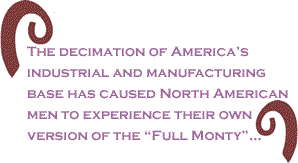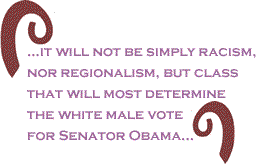With
months left in this seemingly never-ending election season, men
have gotten used to the ritual of observing their wives or significant
other grin at the TV whenever Senator Obama graces the screen. Senator
Obama does not even have to be delivering one of his historic speeches
- which seem to occur every other day - in order to elicit such
a response. He can be answering questions, shaking hands, or merely
strolling across the tarmac on his way to an event, and men watch
as the women in their lives edge closer to the television to openly
adore this Democratic presidential nominee.
What
men might not have become accustomed to are the powerful reactions
Senator Obama generates among other men. In fact, some may find
it unusual the way other men tend to gravitate towards the TV whenever
Senator Obama is on; or how men seem to offer Mr. Obama their full
attention - a rarity in male culture - whenever he speaks; or -
the unspeakable - how men can even be observed curling the corners
of their mouths into a grin while looking at the Senator Obama as
well.
The
indelible image of an African American man crying during a speech
by Senator Obama in Pennsylvania - posted on the front page of theroot.com
the day after - vividly captured the powerful reactions that Senator
Obama has been able to generate among men. And while commentators
may attribute this particular level of reaction to feelings of “racial
pride” or being “caught up” in a moment, in reality, the reactions
among men to Senator Obama are not limited to black men. An article
in Salon titled, Hey, Obama boys: Back off already! “motley crew
of men” in their praise and adulation of the Senator from Illinois.
So
why has this one man been able to make women smile and men cry?
Moreover, why do men as racially, sexually, politically, and culturally
diverse as Colin Powell, Michael Eric Dyson, Andrew Sullivan, Tom
Joyner, Ted Kennedy, Bill Richardson, Christopher Hitchens appear
to have such a “man crush” on Senator Obama?
 Political
pundits will attribute Senator Obama’s broad appeal to a variety
of factors, ranging from his “charisma” and the unique qualities
that set him apart as a candidate - such as his oratorical skills
- to his “populist message” and the belief that he represents the
potential to reach across party lines and end the gridlock that
currently exists in Washington.
Others even suggest that Senator Obama’s appeal evidences this nation’s
deep hope and vision for a “post-racial” American society. However,
commentators have offered little explanation for why Senator Obama
enjoys such strong support among men. The few critics that have
talked about gender in relationship to men and Senator Obama usually
point to sexism as the main reason why men appear to have any affinity
for him at all. Political
pundits will attribute Senator Obama’s broad appeal to a variety
of factors, ranging from his “charisma” and the unique qualities
that set him apart as a candidate - such as his oratorical skills
- to his “populist message” and the belief that he represents the
potential to reach across party lines and end the gridlock that
currently exists in Washington.
Others even suggest that Senator Obama’s appeal evidences this nation’s
deep hope and vision for a “post-racial” American society. However,
commentators have offered little explanation for why Senator Obama
enjoys such strong support among men. The few critics that have
talked about gender in relationship to men and Senator Obama usually
point to sexism as the main reason why men appear to have any affinity
for him at all.
An
alternative explanation for why Senator Obama currently enjoys such
support among men is that many see in him a validation and recognition
that they find wildly appealing. “Obamamania” among men may represent
a sort of “triumph” of white-collar masculinity stemming from the
structural and cultural tensions created as America is transformed from a blue-collar manufacturing
economy to a technological and service-based economy.

The
meteoric rise of Senator Obama comes on the heels of a precipitous
decline in the standard of living for most Americans, especially
men. The decimation of America’s industrial and manufacturing
base has caused North American men to experience their own version
of the “Full Monty”, a decline that has been particularly heart-felt
for working class men of color. However, at the same time that de-industrialization
and downsizing has crippled America’s industrial and manufacturing base, there
has been an expansion of jobs that require education and advanced
training. Economist Julianne Malveaux estimates that positions requiring
an associate degree or higher levels of education will account for
44 percent of future economic growth.
The
result has been not only a growing class divide within American
society, but also division between men. According to the Bureau
of Labor Statistics, the two largest occupation categories for black
males in 2004 were professional, managerial and related occupations
(21.7%) and production, transportation, and material moving occupations
(26.5%). The most common occupations for white males were professional,
managerial and related occupations (33.1%) and natural resources,
construction, and maintenance occupations (19.7%). Rebecca Blank,
former Dean of Public Policy at the University of Michigan and member
of the President’s Council of Economic Advisors under the Clinton
administration, noted in her book, It Takes A Nation, that less-skilled
men in virtually every occupation and industry have faced wage declines,
while more-skilled men have experienced increases in earnings.
 Yet,
despite the overwhelming trend away from blue-collar jobs and tear-jerking
stories written in the New York Times like “Blue-Collar Jobs
Disappear, Taking Families Way of Life Along”, many of the most
powerful expressions of masculinity within contemporary American
society continue to be associated with blue-collar masculinities.
The unprecedented popularity of video games like Grand Theft Auto,
Halo, Madden Football and the explosion of professional blood sports
like Ultimate Fighting into the mainstream exemplify this trend.
In addition, movies like 300, American Gangsta, Jackass - The Movie,
most of Will Ferrell’s movies; television shows like South Park,
Wild N Out, Rob & Big, and Flavor Of Love; and the ubiquitous
images of Hip Hop/Rap Music continue to demonstrate a basic tension
for males in modern society: while society is becoming less reliant
on men’s bodies and men’s brawn, most of the dominant images of
masculinity remain rooted in such “traditional” masculinity. In
the realm of political and popular culture, the class divisions
among men have never been strictly economic in nature. Larry the
Cable Guy does not convey the same sense of humor as Bill Maher
[even though both are hysterical]; Kal Penn does not project the
same type of public masculinity as a Fareed Zakaria; and Lil Wayne
certainly does not signify the same cultural sensibilities as Julian
Bond. Yet,
despite the overwhelming trend away from blue-collar jobs and tear-jerking
stories written in the New York Times like “Blue-Collar Jobs
Disappear, Taking Families Way of Life Along”, many of the most
powerful expressions of masculinity within contemporary American
society continue to be associated with blue-collar masculinities.
The unprecedented popularity of video games like Grand Theft Auto,
Halo, Madden Football and the explosion of professional blood sports
like Ultimate Fighting into the mainstream exemplify this trend.
In addition, movies like 300, American Gangsta, Jackass - The Movie,
most of Will Ferrell’s movies; television shows like South Park,
Wild N Out, Rob & Big, and Flavor Of Love; and the ubiquitous
images of Hip Hop/Rap Music continue to demonstrate a basic tension
for males in modern society: while society is becoming less reliant
on men’s bodies and men’s brawn, most of the dominant images of
masculinity remain rooted in such “traditional” masculinity. In
the realm of political and popular culture, the class divisions
among men have never been strictly economic in nature. Larry the
Cable Guy does not convey the same sense of humor as Bill Maher
[even though both are hysterical]; Kal Penn does not project the
same type of public masculinity as a Fareed Zakaria; and Lil Wayne
certainly does not signify the same cultural sensibilities as Julian
Bond.

With
degrees from institutions like Columbia and
Harvard, and a background teaching Constitutional Law at the University
of Chicago, it is no surprise that Senator
Obama represents a break from conventional images of masculinity.
However, it is not Senator Obama’s educational bona fides that distinguish
him from “traditional” masculinity in American society - George
W. Bush has a degree from Yale
University yet remains within the traditional
paradigm. On the one hand, what distinguishes Senator Obama is his
extremely high level of performance in speeches and debates. [As
an aside, I continue to be amazed about the number of people that
have cried during a Barack Obama speech.] In this respect, the reason
why men crowd televisions to watch Senator Obama speak is the same
reason why basketball players would rush home to watch Michael Jordan
play, or why people who have no knowledge or interest in golf will
interrupt their day to watch Tiger Woods tee up. These men perform
at levels that are without equal in their respective fields - it
just so happens that Senator Obama performs white-collar masculinity.
On the other hand, what sets his particular brand of masculinity
apart is his ability to blend aspects of both blue-collar and white-collar
masculinities. Senator Obama not only plays word games like Taboo,
he also plays basketball. And before Barack Obama was the editor
and president of the Harvard Law Review, he was stomping the streets
on the South Side of Chicago as a community organizer.
Consequently,
the key to Senator Obama’s appeal among men is not solely his intelligence
or his elocution, but his smooth and unflappable character, or simply
his “coolness”. Senator Obama has become the embodiment of smooth.
He is like one of the agents in the Matrix trilogy who moves so
fast you can’t tell he’s dodging bullets. He possesses a “grace
under fire” that men have always found intoxicating. Similar to
a “Black Frank Sinatra”, Senator Obama posses a Billy Dee Williams
type of cool.
The
result is that Senator Obama has accomplished what men like John
Kerry and former Al Gore were not able to accomplish - he has brought
sexy back to white-collar masculinity.

For
African American men, Senator Obama has accomplished something even
more extraordinary - arguably single-handedly transforming the black
public sphere. It is no longer “easy” to view black men solely through
the lens of deficiencies, bad behavior, their bodies, or even their
relationship to black women. As a result, Senator Obama occupies
a peculiar place in the collective imagination of African American
men. For example, he must be the only black man in America that can smile as often as he does and
still be taken seriously by other black men.
 Martin
Linsky attempted to explain this unique blending of masculinity
in Newsweek by referring to Senator Obama as the “First Female President”
and arguing that Senator Obama embodied the qualities and values
normally associated with women. While it is true that modern white-collar
masculinity can be viewed in relation to the emergence of “pink-collar”
jobs and fears of the “feminization” of professional categories,
the stature of Senator Obama among men does not necessarily represent
a culture war between men and women as much as it represents conflict
between men. Middle class white men compete with the public masculinities
of Howard Stern and Ben Stiller just as middle class black men compete
with the public masculinities of Flavor Flav and Pac Man Jones. Martin
Linsky attempted to explain this unique blending of masculinity
in Newsweek by referring to Senator Obama as the “First Female President”
and arguing that Senator Obama embodied the qualities and values
normally associated with women. While it is true that modern white-collar
masculinity can be viewed in relation to the emergence of “pink-collar”
jobs and fears of the “feminization” of professional categories,
the stature of Senator Obama among men does not necessarily represent
a culture war between men and women as much as it represents conflict
between men. Middle class white men compete with the public masculinities
of Howard Stern and Ben Stiller just as middle class black men compete
with the public masculinities of Flavor Flav and Pac Man Jones.

Perhaps
the easiest arena in which to see the battle between blue-collar
and white-collar masculinities play out in this election is in discussions
of the “white male” vote. Often derisively referred to as the “Bubba
Voters” - as in Thomas Schaller’s trenchant article, So Long White
Boy - working class white males voters have not been nearly as receptive
to Senator Obama’s “A Change We Can Believe In” message as college-educated
white male voters. This suggests that it will not be simply racism,
nor regionalism, but class that will most determine the white male
vote for Senator Obama in the November elections.
At
a time when America lags behind
virtually every other industrialized nation in education and economic
growth, many Americans see in Senator Obama an embodiment of policies
that make this nation relevant for the challenges of a changing
world.  However,
men also see in Senator Obama a masculinity that they can identify
with and aspire to. After eight years of the failed experiment of
having the type of president that men would rather have a beer with,
Senator Obama’s public brand of masculinity would be more similar
to European heads of state. The contrast between the current president
and Senator Obama who often appears brilliant, the epitome of smooth,
and highly articulate, is quite striking! However,
men also see in Senator Obama a masculinity that they can identify
with and aspire to. After eight years of the failed experiment of
having the type of president that men would rather have a beer with,
Senator Obama’s public brand of masculinity would be more similar
to European heads of state. The contrast between the current president
and Senator Obama who often appears brilliant, the epitome of smooth,
and highly articulate, is quite striking!
 Let’s
face it, the Senator from Illinois
with the good looks and the winning smile is not only attractive
to women. The guy with the big ears and big brain possesses what
Harvard political scientist Martin Kilson referred to as “a high-order
gentlemanliness” quality about him. He also personifies a post-industrial
and post-modern version of masculinity for men and boys facing a
changing world that is not quite sure what to do with them. Let’s
face it, the Senator from Illinois
with the good looks and the winning smile is not only attractive
to women. The guy with the big ears and big brain possesses what
Harvard political scientist Martin Kilson referred to as “a high-order
gentlemanliness” quality about him. He also personifies a post-industrial
and post-modern version of masculinity for men and boys facing a
changing world that is not quite sure what to do with them.
It
is for this reason that so many men find him to be an attractive
candidate, and why men have such a Man Crush on him as well.

BlackCommentator.com Guest Commentator, Jewel Woods, holds a bachelor’s degree from Oberlin College, a Master’s in Sociology from
The University of Toledo,
and a Master’s in Social Work from The University
of Michigan. Jewel is a 2005 New Voices
Fellow, a former participant in the Minority Scholar’s Program at
The University of Chicago and a select member of the Fragile Families Data Workshop at
Columbia University.
Working toward earning a PhD in Social Work with a specialization
in men’s issues, Jewel is a gender analyst
and the founder and executive director of The Renaissance Male Project, Inc. a non-profit
advocacy and accountability organization for men and boys. Additionally,
he is
the co-author of Don't
Blame It on Rio: The Real Deal Behind Why Men Go to Brazil for Sex . Click here to contact Mr. Woods. . Click here to contact Mr. Woods. |





































 Political
pundits will attribute Senator Obama’s broad appeal to a variety
of factors, ranging from his “charisma” and the unique qualities
that set him apart as a candidate - such as his oratorical skills
- to his “populist message” and the belief that he represents the
potential to reach across party lines and end the gridlock that
currently exists in
Political
pundits will attribute Senator Obama’s broad appeal to a variety
of factors, ranging from his “charisma” and the unique qualities
that set him apart as a candidate - such as his oratorical skills
- to his “populist message” and the belief that he represents the
potential to reach across party lines and end the gridlock that
currently exists in 
 Yet,
despite the overwhelming trend away from blue-collar jobs and tear-jerking
stories written in the New York Times like “Blue-Collar Jobs
Disappear, Taking Families Way of Life Along”, many of the most
powerful expressions of masculinity within contemporary American
society continue to be associated with blue-collar masculinities.
The unprecedented popularity of video games like Grand Theft Auto,
Halo, Madden Football and the explosion of professional blood sports
like Ultimate Fighting into the mainstream exemplify this trend.
In addition, movies like 300, American Gangsta, Jackass - The Movie,
most of Will Ferrell’s movies; television shows like South Park,
Wild N Out, Rob & Big, and Flavor Of Love; and the ubiquitous
images of Hip Hop/Rap Music continue to demonstrate a basic tension
for males in modern society: while society is becoming less reliant
on men’s bodies and men’s brawn, most of the dominant images of
masculinity remain rooted in such “traditional” masculinity. In
the realm of political and popular culture, the class divisions
among men have never been strictly economic in nature. Larry the
Cable Guy does not convey the same sense of humor as Bill Maher
[even though both are hysterical]; Kal Penn does not project the
same type of public masculinity as a Fareed Zakaria; and Lil Wayne
certainly does not signify the same cultural sensibilities as Julian
Bond.
Yet,
despite the overwhelming trend away from blue-collar jobs and tear-jerking
stories written in the New York Times like “Blue-Collar Jobs
Disappear, Taking Families Way of Life Along”, many of the most
powerful expressions of masculinity within contemporary American
society continue to be associated with blue-collar masculinities.
The unprecedented popularity of video games like Grand Theft Auto,
Halo, Madden Football and the explosion of professional blood sports
like Ultimate Fighting into the mainstream exemplify this trend.
In addition, movies like 300, American Gangsta, Jackass - The Movie,
most of Will Ferrell’s movies; television shows like South Park,
Wild N Out, Rob & Big, and Flavor Of Love; and the ubiquitous
images of Hip Hop/Rap Music continue to demonstrate a basic tension
for males in modern society: while society is becoming less reliant
on men’s bodies and men’s brawn, most of the dominant images of
masculinity remain rooted in such “traditional” masculinity. In
the realm of political and popular culture, the class divisions
among men have never been strictly economic in nature. Larry the
Cable Guy does not convey the same sense of humor as Bill Maher
[even though both are hysterical]; Kal Penn does not project the
same type of public masculinity as a Fareed Zakaria; and Lil Wayne
certainly does not signify the same cultural sensibilities as Julian
Bond.

 Martin
Linsky attempted to explain this unique blending of masculinity
in Newsweek by referring to Senator Obama as the “First Female President”
and arguing that Senator Obama embodied the qualities and values
normally associated with women. While it is true that modern white-collar
masculinity can be viewed in relation to the emergence of “pink-collar”
jobs and fears of the “feminization” of professional categories,
the stature of Senator Obama among men does not necessarily represent
a culture war between men and women as much as it represents conflict
between men. Middle class white men compete with the public masculinities
of Howard Stern and Ben Stiller just as middle class black men compete
with the public masculinities of Flavor Flav and Pac Man Jones.
Martin
Linsky attempted to explain this unique blending of masculinity
in Newsweek by referring to Senator Obama as the “First Female President”
and arguing that Senator Obama embodied the qualities and values
normally associated with women. While it is true that modern white-collar
masculinity can be viewed in relation to the emergence of “pink-collar”
jobs and fears of the “feminization” of professional categories,
the stature of Senator Obama among men does not necessarily represent
a culture war between men and women as much as it represents conflict
between men. Middle class white men compete with the public masculinities
of Howard Stern and Ben Stiller just as middle class black men compete
with the public masculinities of Flavor Flav and Pac Man Jones.
 Let’s
face it, the Senator from
Let’s
face it, the Senator from 




